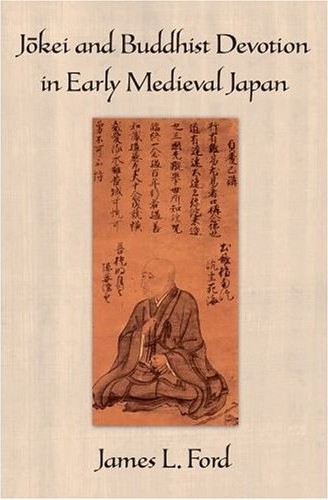Jōkei and Buddhist Devotion in Early Medieval Japan
Book Description
This is the first book-length study in any language of Jōkei (1155-1213), a prominent Buddhist cleric of the Hossō (Yogācāra) school, whose life bridged the momentous transition from Heian (794-1185) to Kamakura (1185-1333) Japan. "Kamakura Buddhism" has drawn notable scholarly attention, largely because it marks the emergence of new schools-Pure Land, Nichiren, and Zen-that came to dominate the Buddhist landscape of Japan. Although Jōkei is invariably cited as one of the leading representatives of established Buddhism during the Kamakura period, he has been seriously neglected by Western scholars.
In this book, James L. Ford aims to shed light on this pivotal and long-overlooked figure. Ford argues convincingly that Jōkei is an ideal personage through which to peer anew into the socio-religious dynamics of early medieval Japan. Indeed, Jōkei is uniquely linked to a number of decisive trends and issues of dispute including: the conflict between the established schools and Honen's exclusive nenbutsu movement; the precept-revival movement; doctrinal reform efforts; the proliferation of prominent "reclusive monks" (tonseisō); the escalation of fundraising (kanjin) campaigns and popular
propagation; and the conspicuous revival of devotion toward Śākyamuni and Maitreya. Jōkei represents a paradigm within established Buddhism that recognized the necessity of accessing other powers through esoteric practices, ritual performances, and objects of devotion. While Jōkei is best known as a leading critic of Honen's exclusive nenbutsu movement and a conservative defender of normative Buddhist principles, he was also a progressive reformer in his own right. Far from defending the status quo, Jōkei envisioned a more accessible, harmonious, and monastically upright form of Buddhism.
Through a detailed examination of Jōkei's extensive writings and activities, Ford challenges many received interpretations of Jōkei's legacy and the transformation of Buddhism in early medieval Japan. This book fills a significant lacuna in Buddhist scholarship.
Reviews
"This first in-depth study of the noted Hossō monk who defended the established schools of Buddhism against the new Kamakura movements in their historic break with traditional values will be required reading for students of Japanese religion for decades to come. It provides new insights for our reassessment of the events of these momentous times which have ripple effects even to the present day. Professor Ford is to be highly commended for his clear-sighted handling of the issues." --Robert E. Morrell, author of Early Kamakura Buddhism: A Minority Report
"To say that James Ford's Jōkei and Buddhist Devotion in Early Medieval Japan is an important contribution to the study of medieval Japanese Buddhism is not a mere commonplace. It fills a long-standing lacuna in both Japanese and western language scholarship. Ford successfully places Jōkei back at the center of our understanding of the Buddhism of the Kamakura era. His treatment of Jōkei is well-developed, presenting Jōkei as an important religious thinker in his own right, and not solely as a sectarian partisan-as has usually been the case. Ford's examination of Jōkei allows us to see Buddhism as it existed for its medieval practitioners, rather than through the lenses of later sectarian rhetorics." -- Richard K. Payne, editor of Discourse and Ideology in Medieval Japanese Buddhism
"Finally, we have a thorough study in English on this extremely important religious figure from medieval Japan. Ford's insightful work provides us with a totally new grounding to understand Jōkei's life and thought. It also illustrates, from Jōkei's unique perspective, the intricate relationship between the court and the Buddhist order, the celebrated rivalry between the 'Old Buddhism' and 'New Buddhism,' the influence of Esoteric Buddhism on new doctrinal developments, and other major traits of Buddhism in the most tumultuous period in Japanese religious history. With its lucid narrative and incisive analysis, James Ford's work is a gem that illumines amidst the ongoing process of revising our knowledge of Japanese Buddhism." -- Ryuichi Abe, author of The Weaving of Mantra: Kukai and the Construction of Esoteric Buddhist Discourse
Product Details
320 pages; 2 maps; 6-1/8 x 9-1/4;
ISBN13: 978-0-19-518814-1
ISBN10: 0-19-518814-4
Links
Oxford University Press
Amazon.com
Barnes and Noble.com
